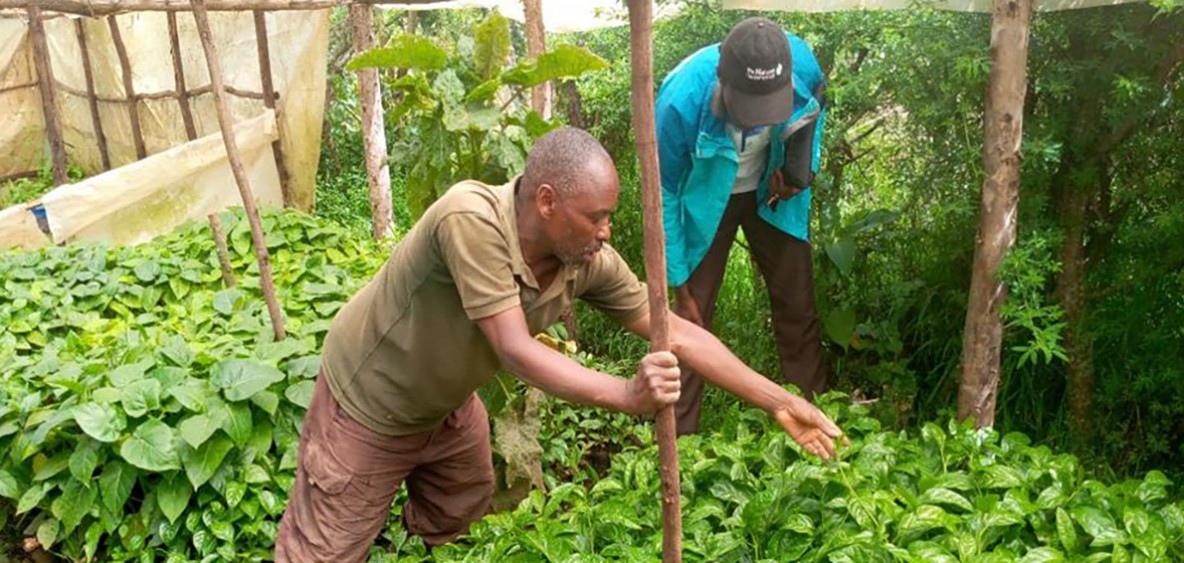
Where government COVID-19 restrictions prevented traditional provision of extension services, and in order to increase the reach of agricultural information already shared, the RFS country project team in Kenya turned to SMS-based communication systems to advise and support farmers.
Adapted from an original article written by John Gathagu, The Nature Conservancy.
Mobile phone technology offers an easy, affordable, effective way to bridge information gaps and connect the links of agricultural value chains — even during times of widespread lockdowns and social distancing under COVID-19.
When RFS community work in the Upper Tana watershed came to a halt in March 2020 because of government travel and social distancing restrictions, the country project team explored ways of continuing conservation work without in-person support.
For years, agriculture in Kenya has been influenced by both climatic and human-induced factors. In rural areas, the impact of inadequate rains on agricultural production has been particularly severe due to the predominance of rain-fed cropping systems. Climate projections indicate that rainfall variability is likely to increase in the region and further impact food security for the rapidly increasing human population.
These challenges have been compounded by inadequate or non-existent extension services to farmers. Smallholder farmers not only require services to improve crop productivity but also advice on other development areas like access to markets, value addition, and diversified income generation opportunities.
To counter this, the RFS implementing agency in Kenya, The Nature Conservancy, rolled out a partnership programme with county governments to support, train and link farmers to agricultural extension services through innovative communication channels, including SMS-messaging platforms.
In just four years, the project has partnered with the county governments of Laikipia, Nyeri, Murang’a and Nyandarua to support more than 50,000 smallholder farmers. Each county government has seconded a full-time county extension officer to the project. The project has further recruited 15 youths as technology promoters to support farmers in the implementation of sustainable technologies for rainwater harvesting and irrigation.
To increase the number of farmers reached through extension services, the RFS Kenya project developed a mobile phone SMS platform that provides for two-way communication between individual farmers and extension officers. The platform, which has more than 37,000 registered farmers, conveys information related to conservation techniques, weather patterns and accessing farm inputs.
Kenya is not the only RFS country project leveraging the power of mobile phones to improve the reach of extension services. In Eswatini, the RFS project has rolled out an SMS-based messaging system linked to the national Agricultural Market and Information System (AMIS). The messaging system is designed to support the dissemination of information quickly and over a vast area.
The COVID-19 pandemic has highlighted the current and future value of these platforms. In Eswatini, the SMS system helped deliver essential information, including early warning for disease outbreaks, weather information, and marketing and pricing guidance, during periods when extension officers were restricted from travelling. In Kenya, the functionality of the SMS platform was expanded to facilitate the distribution of project materials, capitalising on partners who were able to operate due to their essential service status.
Through the SMS platform, communities were able to request water pan liners, which the project then procured and delivered. To maintain social distance and avoid crowding, three farmers were scheduled each day to collect the liners at central locations communicated to them via SMS. The pilot has been so successful that the Kenya project is working to expand the use of the SMS system to accelerate the distribution of other project materials, including tree seedlings.
In both Kenya and Eswatini, the use of SMS communication is saving the project teams time and resources while still ensuring beneficiaries get the most up-to-date information and support, proving to be a win-win for project beneficiaries and country project teams alike. Since the onset of the COVID-19 pandemic, innovations like these have been essential in maintaining project momentum in the face of significant setbacks.
Subscribe to our monthly newsletter to receive updates on stories directly from the field across all our projects, upcoming events, new resources, and more.